莎士比亚十四行诗终审稿)
莎士比亚体的十四行诗
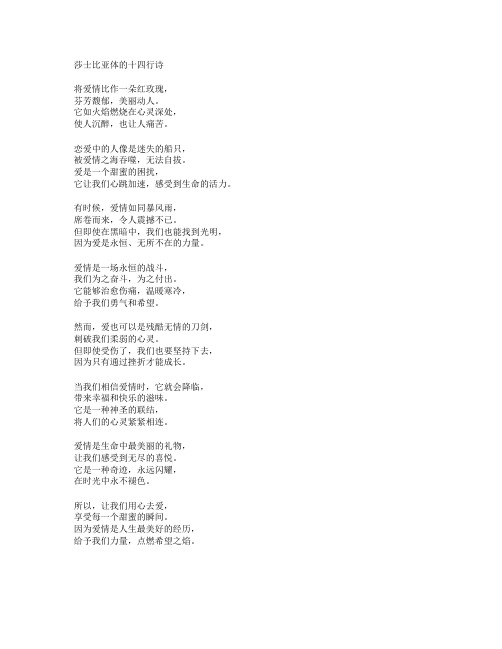
莎士比亚体的十四行诗
将爱情比作一朵红玫瑰,
芬芳馥郁,美丽动人。
它如火焰燃烧在心灵深处,
使人沉醉,也让人痛苦。
恋爱中的人像是迷失的船只,
被爱情之海吞噬,无法自拔。
爱是一个甜蜜的困扰,
它让我们心跳加速,感受到生命的活力。
有时候,爱情如同暴风雨,
席卷而来,令人震撼不已。
但即使在黑暗中,我们也能找到光明,因为爱是永恒、无所不在的力量。
爱情是一场永恒的战斗,
我们为之奋斗,为之付出。
它能够治愈伤痛,温暖寒冷,
给予我们勇气和希望。
然而,爱也可以是残酷无情的刀剑,
刺破我们柔弱的心灵。
但即使受伤了,我们也要坚持下去,
因为只有通过挫折才能成长。
当我们相信爱情时,它就会降临,
带来幸福和快乐的滋味。
它是一种神圣的联结,
将人们的心灵紧紧相连。
爱情是生命中最美丽的礼物,
让我们感受到无尽的喜悦。
它是一种奇迹,永远闪耀,
在时光中永不褪色。
所以,让我们用心去爱,
享受每一个甜蜜的瞬间。
因为爱情是人生最美好的经历,
给予我们力量,点燃希望之焰。
莎士比亚十四行诗精选带翻译
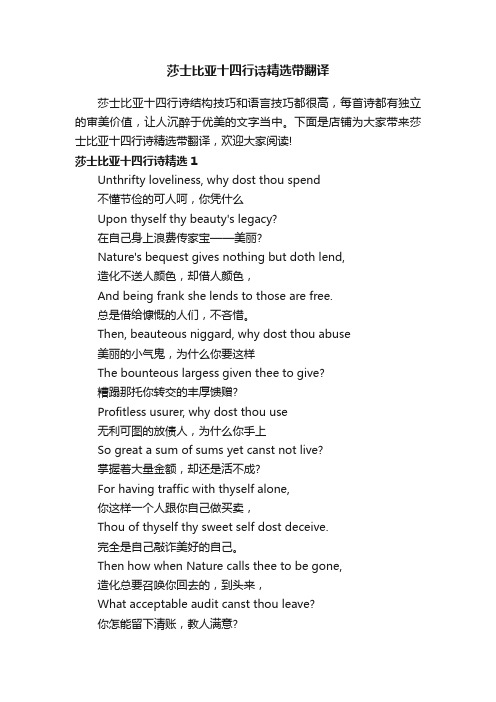
莎士比亚十四行诗精选带翻译莎士比亚十四行诗结构技巧和语言技巧都很高,每首诗都有独立的审美价值,让人沉醉于优美的文字当中。
下面是店铺为大家带来莎士比亚十四行诗精选带翻译,欢迎大家阅读!莎士比亚十四行诗精选1Unthrifty loveliness, why dost thou spend不懂节俭的可人呵,你凭什么Upon thyself thy beauty's legacy?在自己身上浪费传家宝——美丽?Nature's bequest gives nothing but doth lend,造化不送人颜色,却借人颜色,And being frank she lends to those are free.总是借给慷慨的人们,不吝惜。
Then, beauteous niggard, why dost thou abuse美丽的小气鬼,为什么你要这样The bounteous largess given thee to give?糟蹋那托你转交的丰厚馈赠?Profitless usurer, why dost thou use无利可图的放债人,为什么你手上So great a sum of sums yet canst not live?掌握着大量金额,却还是活不成?For having traffic with thyself alone,你这样一个人跟你自己做买卖,Thou of thyself thy sweet self dost deceive.完全是自己敲诈美好的自己。
Then how when Nature calls thee to be gone,造化总要召唤你回去的,到头来,What acceptable audit canst thou leave?你怎能留下清账,教人满意?Thy unused beauty must be tombed with thee,美,没有用过的,得陪你进坟墓,Which, used, lives th' executor to be.用了的,会活着来执行你的遗嘱。
shakespeare's sonnets(莎士比亚的十四行诗)

Toetry can defies the time and preserve and eternalize man‟s beauty and youth.
Sonnet 29
When in disgrace with fortune and men's eyes, I all alone beweep my outcast state, And trouble deaf Heaven with my bootless cries, And look upon myself, and curse my fate, Wishing me like to one more rich in hope, Featur'd like him, like him with friends possess'd, Desiring this man's art, and that man's scope, With what I most enjoy contented least: Yet in these thoughts myself almost despising, Haply I think on thee,--and then my state (Like to the lark at break of day arising From sullen earth) sings hymns at heaven's gate; For thy sweet love remember'd such wealth brings That then I scorn to change my state with kings'.
Second quatrain
莎翁经典十四行诗

莎翁经典十四行诗:When in the chronicle of wasted timeI see descriptions of the fairest wights,And beauty making beautiful old rhymeIn praise of ladies dead and lovely knights,Then, in the blazon of sweet beauty's best,Of hand, of foot, of lip, of eye, of brow,I see their antique pen would have express'dEven such a beauty as you master now.So all their praises are but propheciesOf this our time, all you prefiguring;And, for they look'd but with divining eyes,They had not skill enough your worth to sing: For we, which now behold these present days,Had eyes to wonder, but lack tongues to praise.当我从那湮远的古代的纪年发见那绝代风流人物的写真,艳色使得古老的歌咏也香艳,颂赞着多情骑士和绝命佳人,于是,从那些国色天姿的描画,无论手脚、嘴唇、或眼睛或眉额,我发觉那些古拙的笔所表达恰好是你现在所占领的姿色。
所以他们的赞美无非是预言我们这时代,一切都预告着你;不过他们观察只用想象的眼,还不够才华把你歌颂得尽致:而我们,幸而得亲眼看见今天,只有眼惊羡,却没有舌头咏叹。
:Not mine own fears, nor the prophetic soulOf the wide world dreaming on things to come,Can yet the lease of my true love control,Supposed as forfeit to a confined doom.The mortal moon hath her eclipse enduredAnd the sad augurs mock their own presage;Incertainties now crown themselves assuredAnd peace proclaims olives of endless age.Now with the drops of this most balmy timeMy love looks fresh, and death to me subscribes, Since, spite of him, I'll live in this poor rhyme, While he insults o'er dull and speechless tribes: And thou in this shalt find thy monument,When tyrants' crests and tombs of brass are spent.无论我自己的忧虑,或那梦想着未来的这茫茫世界的先知灵魂,都不能限制我的真爱的租约,纵使它已注定作命运的抵偿品。
莎士比亚十四行诗原文译文探析
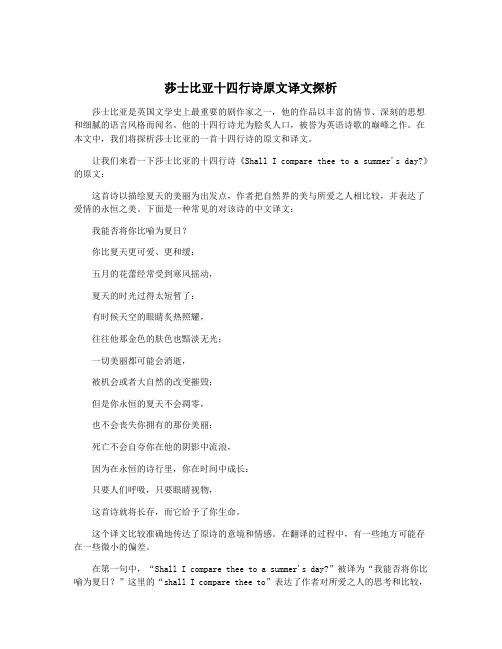
莎士比亚十四行诗原文译文探析莎士比亚是英国文学史上最重要的剧作家之一,他的作品以丰富的情节、深刻的思想和细腻的语言风格而闻名。
他的十四行诗尤为脍炙人口,被誉为英语诗歌的巅峰之作。
在本文中,我们将探析莎士比亚的一首十四行诗的原文和译文。
让我们来看一下莎士比亚的十四行诗《Shall I compare thee to a summer's day?》的原文:这首诗以描绘夏天的美丽为出发点,作者把自然界的美与所爱之人相比较,并表达了爱情的永恒之美。
下面是一种常见的对该诗的中文译文:我能否将你比喻为夏日?你比夏天更可爱、更和缓:五月的花蕾经常受到寒风摇动,夏天的时光过得太短暂了:有时候天空的眼睛炙热照耀,往往他那金色的肤色也黯淡无光;一切美丽都可能会消逝,被机会或者大自然的改变摧毁;但是你永恒的夏天不会凋零,也不会丧失你拥有的那份美丽;死亡不会自夸你在他的阴影中流浪,因为在永恒的诗行里,你在时间中成长:只要人们呼吸,只要眼睛视物,这首诗就将长存,而它给予了你生命。
这个译文比较准确地传达了原诗的意境和情感。
在翻译的过程中,有一些地方可能存在一些微小的偏差。
在第一句中,“Shall I compare thee to a summer's day?”被译为“我能否将你比喻为夏日?”这里的“shall I compare thee to”表达了作者对所爱之人的思考和比较,而“可以将你比喻为”则表达的是一种询问和请求的语气。
译文中的表达方式稍微有些软弱,不太能够传达原文中的自信和自豪之情。
在第二句中,“Thou art more lovely and more temperate”被译为“你比夏天更可爱、更和缓”,这里的“art”是表示存在的动词,应该译为“是”,而不是“比”。
译文中的表达方式稍微有些不准确。
虽然这个译文能够大体上传达原文的意境和情感,但在一些细节的表达上存在一些微小的偏差。
在翻译莎士比亚的十四行诗时,我们应该更加注重原文的语言风格和情感表达,努力做到准确传达原文的意思。
莎士比亚精选十四行诗
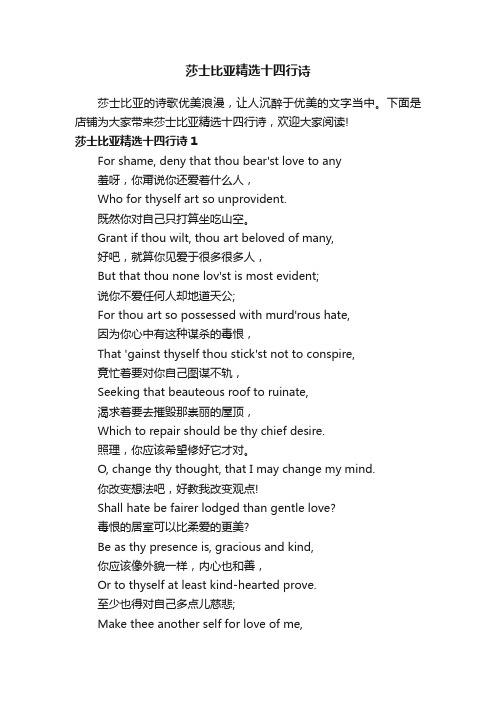
莎士比亚精选十四行诗莎士比亚的诗歌优美浪漫,让人沉醉于优美的文字当中。
下面是店铺为大家带来莎士比亚精选十四行诗,欢迎大家阅读!莎士比亚精选十四行诗1For shame, deny that thou bear'st love to any羞呀,你甭说你还爱着什么人,Who for thyself art so unprovident.既然你对自己只打算坐吃山空。
Grant if thou wilt, thou art beloved of many,好吧,就算你见爱于很多很多人,But that thou none lov'st is most evident;说你不爱任何人却地道天公;For thou art so possessed with murd'rous hate,因为你心中有这种谋杀的毒恨,That 'gainst thyself thou stick'st not to conspire,竟忙着要对你自己图谋不轨,Seeking that beauteous roof to ruinate,渴求着要去摧毁那崇丽的屋顶,Which to repair should be thy chief desire.照理,你应该希望修好它才对。
O, change thy thought, that I may change my mind.你改变想法吧,好教我改变观点!Shall hate be fairer lodged than gentle love?毒恨的居室可以比柔爱的更美?Be as thy presence is, gracious and kind,你应该像外貌一样,内心也和善,Or to thyself at least kind-hearted prove.至少也得对自己多点儿慈悲;Make thee another self for love of me,你爱我,就该去做另一个自身,That beauty still may live in thine or thee.使美在你或你后代身上永存。
shakespeare(sonnet) 英国文学 十四行诗

Iambic pentameter
1 2 3 4 5
•
•
•
•
U / U / U / U / U / One day I wrote her name u pon the strand, U / U / U / U/U / But came the waves and wash ed it a way: U / U / U / U / U / A gain I wrote it with a sec ond hand, U / U / U / U / U / But came the tide, and made my pains his prey
A sonnet is
• • • • • a lyric poem consisting of fourteen lines written in iambic pentameter with a definite rime scheme and a definite tho夏日? 你可是更加可爱,更加温婉; 狂风会吹落五月里开的好花儿, 夏季租出的日子又未免太短暂:
Paraphrasing:
• Quatrain 1: Shall I compare you to a day in summer that is very beautiful here in England? Yet this comparison is not sufficient, because you are more beautiful and less extreme than the summer. The winds of summer are rough on the budding life, and the duration of summer usually does not last very long.
莎士比亚十四行诗
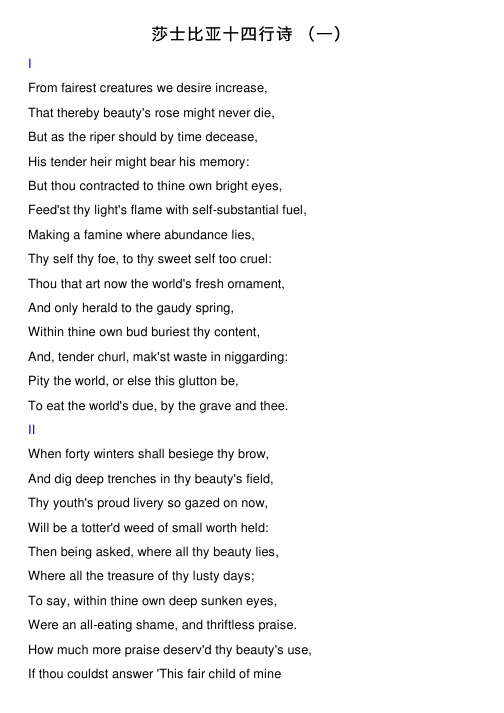
莎⼠⽐亚⼗四⾏诗(⼀)IFrom fairest creatures we desire increase,That thereby beauty's rose might never die,But as the riper should by time decease,His tender heir might bear his memory:But thou contracted to thine own bright eyes,Feed'st thy light's flame with self-substantial fuel, Making a famine where abundance lies,Thy self thy foe, to thy sweet self too cruel:Thou that art now the world's fresh ornament,And only herald to the gaudy spring,Within thine own bud buriest thy content,And, tender churl, mak'st waste in niggarding:Pity the world, or else this glutton be,To eat the world's due, by the grave and thee.IIWhen forty winters shall besiege thy brow,And dig deep trenches in thy beauty's field,Thy youth's proud livery so gazed on now,Will be a totter'd weed of small worth held:Then being asked, where all thy beauty lies,Where all the treasure of thy lusty days;To say, within thine own deep sunken eyes,Were an all-eating shame, and thriftless praise.How much more praise deserv'd thy beauty's use,If thou couldst answer 'This fair child of mineShall sum my count, and make my old excuse,' Proving his beauty by succession thine!This were to be new made when thou art old,And see thy blood warm when thou feel'st it cold. IIILook in thy glass and tell the face thou viewest Now is the time that face should form another; Whose fresh repair if now thou not renewest, Thou dost beguile the world, unbless some mother. For where is she so fair whose unear'd womb Disdains the tillage of thy husbandry?Or who is he so fond will be the tombOf his self-love, to stop posterity?Thou art thy mother's glass and she in theeCalls back the lovely April of her prime;So thou through windows of thine age shalt see, Despite of wrinkles this thy golden time.But if thou live, remember'd not to be,Die single and thine image dies with thee.IVUnthrifty loveliness, why dost thou spendUpon thy self thy beauty's legacy?Nature's bequest gives nothing, but doth lend, And being frank she lends to those are free: Then, beauteous niggard, why dost thou abuse The bounteous largess given thee to give? Profitless usurer, why dost thou useSo great a sum of sums, yet canst not live?For having traffic with thy self alone,Thou of thy self thy sweet self dost deceive:Then how when nature calls thee to be gone, What acceptable audit canst thou leave?Thy unused beauty must be tombed with thee, Which, used, lives th' executor to be.VThose hours, that with gentle work did frameThe lovely gaze where every eye doth dwell,Will play the tyrants to the very sameAnd that unfair which fairly doth excel;For never-resting time leads summer onTo hideous winter, and confounds him there;Sap checked with frost, and lusty leaves quite gone, Beauty o'er-snowed and bareness every where: Then were not summer's distillation left,A liquid prisoner pent in walls of glass,Beauty's effect with beauty were bereft,Nor it, nor no remembrance what it was:But flowers distill'd, though they with winter meet, Leese but their show; their substance still lives sweet.VIThen let not winter's ragged hand deface,In thee thy summer, ere thou be distilled:Make sweet some vial; treasure thou some placeWith beauty's treasure ere it be self-killed.That use is not forbidden usury,Which happies those that pay the willing loan; That's for thy self to breed another thee,Or ten times happier, be it ten for one;Ten times thy self were happier than thou art,If ten of thine ten times refigured thee:Then what could death do if thou shouldst depart, Leaving thee living in posterity?Be not self-willed, for thou art much too fairTo be death's conquest and make worms thine heir.VIILo! in the orient when the gracious lightLifts up his burning head, each under eyeDoth homage to his new-appearing sight, Serving with looks his sacred majesty;And having climbed the steep-up heavenly hill, Resembling strong youth in his middle age,Yet mortal looks adore his beauty still, Attending on his golden pilgrimage:But when from highmost pitch, with weary car, Like feeble age, he reeleth from the day,The eyes, 'fore duteous, now converted are From his low tract, and look another way:So thou, thyself outgoing in thy noon Unlooked on diest unless thou get a son.VIIIMusic to hear, why hear'st thou music sadly? Sweets with sweets war not, joy delights in joy: Why lov'st thou that which thou receiv'st not gladly, Or else receiv'st with pleasure thine annoy?If the true concord of well-tuned sounds,By unions married, do offend thine ear,They do but sweetly chide thee, who confoundsIn singleness the parts that thou shouldst bear. Mark how one string, sweet husband to another, Strikes each in each by mutual ordering; Resembling sire and child and happy mother, Who, all in one, one pleasing note do sing: Whose speechless song being many, seeming one, Sings this to thee: 'Thou single wilt prove none.'IXIs it for fear to wet a widow's eye,That thou consum'st thy self in single life?Ah! if thou issueless shalt hap to die,The world will wail thee like a makeless wife;The world will be thy widow and still weepThat thou no form of thee hast left behind,When every private widow well may keepBy children's eyes, her husband's shape in mind: Look what an unthrift in the world doth spend Shifts but his place, for still the world enjoys it;But beauty's waste hath in the world an end,And kept unused the user so destroys it.No love toward others in that bosom sitsThat on himself such murd'rous shame commits.XFor shame deny that thou bear'st love to any,Who for thy self art so unprovident.Grant, if thou wilt, thou art beloved of many,But that thou none lov'st is most evident:For thou art so possessed with murderous hate, That 'gainst thy self thou stick'st not to conspire, Seeking that beauteous roof to ruinateWhich to repair should be thy chief desire.O! change thy thought, that I may change my mind: Shall hate be fairer lodged than gentle love?Be, as thy presence is, gracious and kind,Or to thyself at least kind-hearted prove:Make thee another self for love of me,That beauty still may live in thine or thee.XIAs fast as thou shalt wane, so fast thou grow'stIn one of thine, from that which thou departest;And that fresh blood which youngly thou bestow'st, Thou mayst call thine when thou from youth convertest. Herein lives wisdom, beauty, and increase;Without this folly, age, and cold decay:If all were minded so, the times should ceaseAnd threescore year would make the world away.Let those whom nature hath not made for store,Harsh, featureless, and rude, barrenly perish:Look whom she best endow'd, she gave the more; Which bounteous gift thou shouldst in bounty cherish: She carv'd thee for her seal, and meant thereby,Thou shouldst print more, not let that copy die.XIIWhen I do count the clock that tells the time,And see the brave day sunk in hideous night; When I behold the violet past prime,And sable curls, all silvered o'er with white;When lofty trees I see barren of leaves,Which erst from heat did canopy the herd,And summer's green all girded up in sheaves, Borne on the bier with white and bristly beard, Then of thy beauty do I question make,That thou among the wastes of time must go, Since sweets and beauties do themselves forsake And die as fast as they see others grow;And nothing 'gainst Time's scythe can make defence Save breed, to brave him when he takes thee hence.XIIIO! that you were your self; but, love, you areNo longer yours, than you your self here live: Against this coming end you should prepare,And your sweet semblance to some other give:So should that beauty which you hold in leaseFind no determination; then you wereYourself again, after yourself's decease,When your sweet issue your sweet form should bear. Who lets so fair a house fall to decay,Which husbandry in honour might uphold,Against the stormy gusts of winter's dayAnd barren rage of death's eternal cold?O! none but unthrifts. Dear my love, you know,You had a father: let your son say so.XIVNot from the stars do I my judgement pluck;And yet methinks I have Astronomy,But not to tell of good or evil luck,Of plagues, of dearths, or seasons' quality;Nor can I fortune to brief minutes tell,Pointing to each his thunder, rain and wind,Or say with princes if it shall go wellBy oft predict that I in heaven find:But from thine eyes my knowledge I derive,And, constant stars, in them I read such artAs truth and beauty shall together thrive,If from thyself, to store thou wouldst convert;Or else of thee this I prognosticate:Thy end is truth's and beauty's doom and date.XVWhen I consider every thing that growsHolds in perfection but a little moment,That this huge stage presenteth nought but shows Whereon the stars in secret influence comment; When I perceive that men as plants increase, Cheered and checked even by the self-same sky, Vaunt in their youthful sap, at height decrease, And wear their brave state out of memory;Then the conceit of this inconstant staySets you most rich in youth before my sight, Where wasteful Time debateth with decayTo change your day of youth to sullied night, And all in war with Time for love of you,As he takes from you, I engraft you new.XVIBut wherefore do not you a mightier wayMake war upon this bloody tyrant, Time?And fortify your self in your decayWith means more blessed than my barren rhyme? Now stand you on the top of happy hours,And many maiden gardens, yet unset,With virtuous wish would bear you living flowers, Much liker than your painted counterfeit:So should the lines of life that life repair,Which this, Time's pencil, or my pupil pen, Neither in inward worth nor outward fair,Can make you live your self in eyes of men.To give away yourself, keeps yourself still,And you must live, drawn by your own sweetskill.XVIIWho will believe my verse in time to come,If it were fill'd with your most high deserts? Though yet heaven knows it is but as a tomb Which hides your life, and shows not half your parts. If I could write the beauty of your eyes,And in fresh numbers number all your graces,The age to come would say 'This poet lies;Such heavenly touches ne'er touch'd earthly faces.' So should my papers, yellow'd with their age,Be scorn'd, like old men of less truth than tongue, And your true rights be term'd a poet's rageAnd stretched metre of an antique song:But were some child of yours alive that time,You should live twice, in it, and in my rhyme.XVIIIShall I compare thee to a summer's day?Thou art more lovely and more temperate:Rough winds do shake the darling buds of May, And summer's lease hath all too short a date: Sometime too hot the eye of heaven shines,And often is his gold complexion dimmed,And every fair from fair sometime declines,By chance, or nature's changing course untrimmed: But thy eternal summer shall not fade,Nor lose possession of that fair thou ow'st,Nor shall death brag thou wander'st in his shade, When in eternal lines to time thou grow'st,So long as men can breathe, or eyes can see,So long lives this, and this gives life to thee.XIXDevouring Time, blunt thou the lion's paws,And make the earth devour her own sweet brood; Pluck the keen teeth from the fierce tiger's jaws, And burn the long-liv'd phoenix, in her blood; Make glad and sorry seasons as thou fleet'st, And do whate'er thou wilt, swift-footed Time,To the wide world and all her fading sweets;But I forbid thee one most heinous crime:O! carve not with thy hours my love's fair brow, Nor draw no lines there with thine antique pen; Him in thy course untainted do allowFor beauty's pattern to succeeding men.Yet, do thy worst old Time: despite thy wrong,My love shall in my verse ever live young.XXA woman's face with nature's own hand painted, Hast thou, the master mistress of my passion;A woman's gentle heart, but not acquaintedWith shifting change, as is false women's fashion: An eye more bright than theirs, less false in rolling, Gilding the object whereupon it gazeth;A man in hue all hues in his controlling,Which steals men's eyes and women's souls amazeth. And for a woman wert thou first created;Till Nature, as she wrought thee, fell a-doting,And by addition me of thee defeated,By adding one thing to my purpose nothing.But since she prick'd thee out for women's pleasure, Mine be thy love and thy love's use theirtreasure.XXISo is it not with me as with that Muse,Stirred by a painted beauty to his verse,Who heaven itself for ornament doth useAnd every fair with his fair doth rehearse,Making a couplement of proud compareWith sun and moon, with earth and sea's rich gems, With April's first-born flowers, and all things rare, That heaven's air in this huge rondure hems.O! let me, true in love, but truly write,And then believe me, my love is as fairAs any mother's child, though not so brightAs those gold candles fixed in heaven's air:Let them say more that like of hearsay well;I will not praise that purpose not to sell.XXIIMy glass shall not persuade me I am old,So long as youth and thou are of one date;But when in thee time's furrows I behold,Then look I death my days should expiate. For all that beauty that doth cover thee,Is but the seemly raiment of my heart, Which in thy breast doth live, as thine in me: How can I then be elder than thou art?O! therefore love, be of thyself so waryAs I, not for myself, but for thee will; Bearing thy heart, which I will keep so chary As tender nurse her babe from faring ill. Presume not on thy heart when mine is slain, Thou gav'st me thine not to give back again.。
莎士比亚十四行诗鉴赏

莎士比亚十四行诗鉴赏莎士比亚是英国文学史上最杰出的戏剧家,也是西方文艺史上最杰出的作家之一,全世界最卓越的文学家之一。
他流传下来的作品包括37部戏剧、155首十四行诗、两首长叙事诗和其他诗歌。
他的戏剧有各种主要语言的译本,且表演次数远远超过其他任何戏剧家的作品。
下面是店铺为大家带来莎士比亚十四行诗鉴赏,希望大家喜欢!莎士比亚十四行诗:So shall I live, supposing thou art true,Like a deceived husband; so love's faceMay still seem love to me, though alter'd new;Thy looks with me, thy heart in other place:For there can live no hatred in thine eye,Therefore in that I cannot know thy change.In many's looks the false heart's historyIs writ in moods and frowns and wrinkles strange,But heaven in thy creation did decreeThat in thy face sweet love should ever dwell;Whate'er thy thoughts or thy heart's workings be,Thy looks should nothing thence but sweetness tell.How like Eve's apple doth thy beauty grow,if thy sweet virtue answer not thy show!于是我将活下去,认定你忠贞,像被骗的丈夫,于是爱的面目对我仍旧是爱,虽则已翻了新;眼睛尽望着我,心儿却在别处:憎恨既无法存在于你的眼里,我就无法看出你心肠的改变。
莎士比亚十四行诗原文译文探析
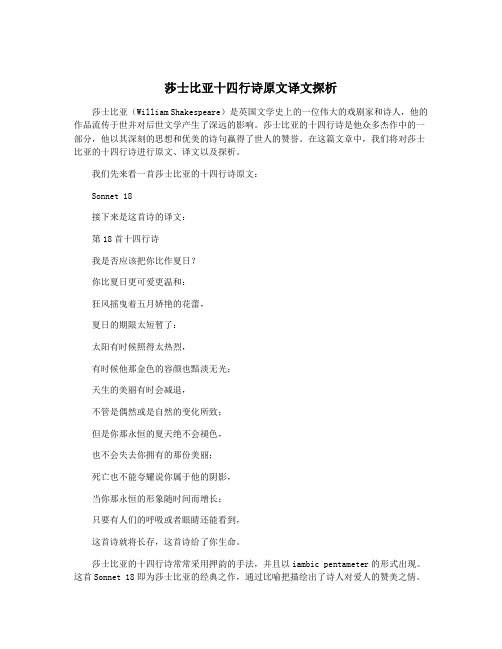
莎士比亚十四行诗原文译文探析莎士比亚(William Shakespeare)是英国文学史上的一位伟大的戏剧家和诗人,他的作品流传于世并对后世文学产生了深远的影响。
莎士比亚的十四行诗是他众多杰作中的一部分,他以其深刻的思想和优美的诗句赢得了世人的赞誉。
在这篇文章中,我们将对莎士比亚的十四行诗进行原文、译文以及探析。
我们先来看一首莎士比亚的十四行诗原文:Sonnet 18接下来是这首诗的译文:第18首十四行诗我是否应该把你比作夏日?你比夏日更可爱更温和:狂风摇曳着五月娇艳的花蕾,夏日的期限太短暂了:太阳有时候照得太热烈,有时候他那金色的容颜也黯淡无光;天生的美丽有时会减退,不管是偶然或是自然的变化所致;但是你那永恒的夏天绝不会褪色,也不会失去你拥有的那份美丽;死亡也不能夸耀说你属于他的阴影,当你那永恒的形象随时间而增长;只要有人们的呼吸或者眼睛还能看到,这首诗就将长存,这首诗给了你生命。
莎士比亚的十四行诗常常采用押韵的手法,并且以iambic pentameter的形式出现。
这首Sonnet 18即为莎士比亚的经典之作,通过比喻把描绘出了诗人对爱人的赞美之情。
诗的开篇即以修辞设问来呈现,作者在问自己是否应该将心上人比作夏日,然后通过下文的赞美,表达出对心上人更为深切的赞美之情。
他认为心上人的美丽胜过夏日,夏日虽然美丽,却不如心上人温和可爱。
由此,诗中呈现了作者对心上人的赞美之情。
在诗的后半部分,诗人使用了“永恒的夏天”来包含对心上人的赞美之语,不管是风吹雨打,都不会改变。
随后,诗人再以修辞手法呼唤死亡无法摧毁对心上人的赞美之情,并肯定了这份美丽将长存与时间,给了心上人永生。
通过以上对原文和译文的对比分析,我们不难发现莎士比亚的十四行诗所蕴含的深刻情感。
诗人通过对夏日和心上人的比较,抒发了对心上人深切的赞美之情,并以永恒的夏天来喻示继续深切的情感长存。
这首诗也正是莎士比亚情感抒发的一个缩影,其深情款款的语言和艺术手法让我们感受到了莎士比亚伟大的文学魅力。
莎士比亚的十四行诗

莎士比亚的十四行诗(实用版)编制人:__________________审核人:__________________审批人:__________________编制单位:__________________编制时间:____年____月____日序言下载提示:该文档是本店铺精心编制而成的,希望大家下载后,能够帮助大家解决实际问题。
文档下载后可定制修改,请根据实际需要进行调整和使用,谢谢!并且,本店铺为大家提供各种类型的实用资料,如教育随笔、日记赏析、句子摘抄、古诗大全、经典美文、话题作文、工作总结、词语解析、文案摘录、其他资料等等,想了解不同资料格式和写法,敬请关注!Download tips: This document is carefully compiled by this editor.I hope that after you download it, it can help you solve practical problems. The document can be customized and modified after downloading, please adjust and use it according to actual needs, thank you!In addition, this shop provides you with various types of practical materials, such as educational essays, diary appreciation, sentence excerpts, ancient poems, classic articles, topic composition, work summary, word parsing, copy excerpts, other materials and so on, want to know different data formats and writing methods, please pay attention!莎士比亚的十四行诗很荣幸同学们能来关注关于莎士比亚的十四行诗爱情_关于浪漫爱情的诗经典句子内容,由本店铺为大家搜集整理发布,让我们赶快一起来学习一下吧!励志的句子、唯美的句子、伤感的句子、优美的句子,这些短句语录都是意蕴深长,适宜于在朋友圈,QQ空间传播。
莎士比亚最经典的九首十四行诗
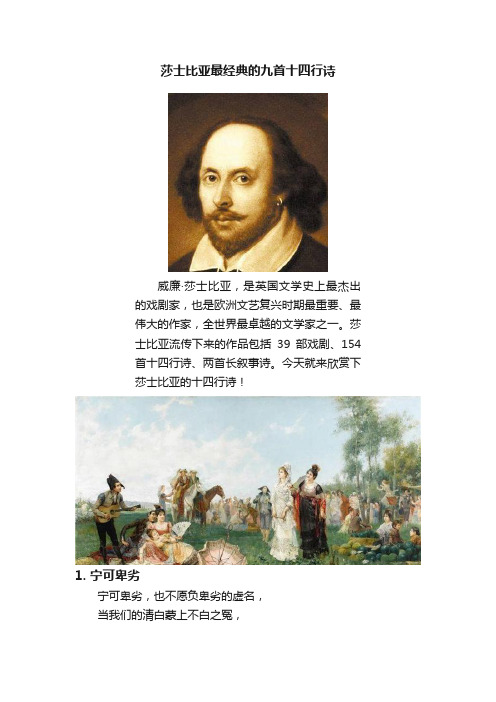
莎士比亚最经典的九首十四行诗威廉·莎士比亚,是英国文学史上最杰出的戏剧家,也是欧洲文艺复兴时期最重要、最伟大的作家,全世界最卓越的文学家之一。
莎士比亚流传下来的作品包括39部戏剧、154首十四行诗、两首长叙事诗。
今天就来欣赏下莎士比亚的十四行诗!1. 宁可卑劣宁可卑劣,也不愿负卑劣的虚名,当我们的清白蒙上不白之冤,当正当的娱乐被人妄加恶声,不体察我们的感情,只凭偏见。
为什么别人虚伪淫猥的眼睛有权赞扬或诋毁我活跃的血?专侦伺我的弱点而比我坏的人为什么把我认为善的恣意污蔑?我就是我,他们对于我的诋毁只能够宣扬他们自己的卑鄙:我本方正,他们的视线自不轨;这种坏心眼怎么配把我非议?除非他们固执这糊涂的邪说:恶是人性,统治着世间的是恶。
2. 爱是亘古长明的灯塔我绝不承认两颗真心的结合,会有任何障碍;爱算不得真爱,若是一看见人家改变便转舵,或者一看见人家转弯便离开。
哦,绝不!爱是亘古长明的灯塔,它定睛望着风暴却兀不为动;爱又是指引迷舟的一颗恒星,你可量它多高,它所值却无穷。
爱不受时光的播弄,尽管红颜和皓齿难免遭受时光的毒手;爱并不因瞬息的改变而改变,它巍然矗立直到末日的尽头。
我这话若说错,并被证明不确,就算我没写诗,也没人真爱过。
3. 我怎么能够把你来比作夏天怎么能够把你来比作夏天?你不独比它可爱也比它温婉狂风把五月宠爱的嫩蕊作践,夏天出凭的期限由未免太短天上的眼睛有时照得太酷烈它那炳耀的金颜又常遭掩蔽被机缘或无常的天道所摧折,没有芳艳不终于凋残或销毁但是你的长夏永远不会凋落也不会损失你这皎洁的红芳或死神夸口你在他的影里漂泊当你在不朽的诗里与时同长只要有人类,或人有眼睛,这诗将长存,并赐给你生命。
4. 你的爱怜抹掉那世俗的讥谗你的爱怜抹掉那世俗的讥谗,打在我额上的耻辱的烙印;别人的毁誉对我有什么相干,你既表扬我的善又把恶遮隐!你是我整个宇宙,我必须努力从你的口里听取我的荣和辱;我把别人,别人把我,都当作死,谁能使我的铁心肠变善或变恶?别人的意见我全扔入了深渊,那么干净,我简直像聋蛇一般,凭他奉承或诽谤都充耳不闻。
莎士比亚十四行诗(51~100)
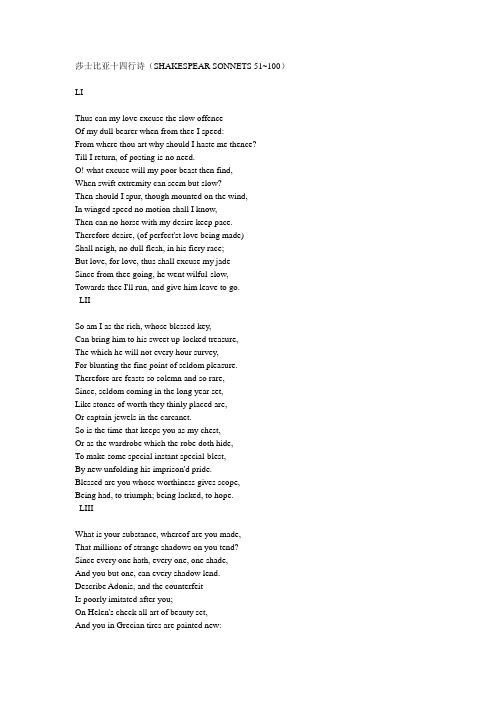
莎士比亚十四行诗(SHAKESPEAR SONNETS 51~100)LIThus can my love excuse the slow offenceOf my dull bearer when from thee I speed:From where thou art why should I haste me thence?Till I return, of posting is no need.O! what excuse will my poor beast then find,When swift extremity can seem but slow?Then should I spur, though mounted on the wind,In winged speed no motion shall I know,Then can no horse with my desire keep pace.Therefore desire, (of perfect'st love being made)Shall neigh, no dull flesh, in his fiery race;But love, for love, thus shall excuse my jade-Since from thee going, he went wilful-slow,Towards thee I'll run, and give him leave to go.LIISo am I as the rich, whose blessed key,Can bring him to his sweet up-locked treasure,The which he will not every hour survey,For blunting the fine point of seldom pleasure.Therefore are feasts so solemn and so rare,Since, seldom coming in the long year set,Like stones of worth they thinly placed are,Or captain jewels in the carcanet.So is the time that keeps you as my chest,Or as the wardrobe which the robe doth hide,To make some special instant special-blest,By new unfolding his imprison'd pride.Blessed are you whose worthiness gives scope,Being had, to triumph; being lacked, to hope.LIIIWhat is your substance, whereof are you made,That millions of strange shadows on you tend?Since every one hath, every one, one shade,And you but one, can every shadow lend.Describe Adonis, and the counterfeitIs poorly imitated after you;On Helen's cheek all art of beauty set,And you in Grecian tires are painted new:Speak of the spring, and foison of the year,The one doth shadow of your beauty show,The other as your bounty doth appear;And you in every blessed shape we know.In all external grace you have some part,But you like none, none you, for constant heart.LIVO! how much more doth beauty beauteous seemBy that sweet ornament which truth doth give.The rose looks fair, but fairer we it deemFor that sweet odour, which doth in it live.The canker blooms have full as deep a dyeAs the perfumed tincture of the roses,Hang on such thorns, and play as wantonlyWhen summer's breath their masked buds discloses: But, for their virtue only is their show,They live unwoo'd, and unrespected fade;Die to themselves. Sweet roses do not so;Of their sweet deaths are sweetest odours made: And so of you, beauteous and lovely youth,When that shall vade, my verse distills your truth. LVNot marble, nor the gilded monumentsOf princes, shall outlive this powerful rhyme;But you shall shine more bright in these contents Than unswept stone, besmear'd with sluttish time. When wasteful war shall statues overturn,And broils root out the work of masonry,Nor Mars his sword, nor war's quick fire shall burn The living record of your memory.'Gainst death, and all oblivious enmityShall you pace forth; your praise shall still find room Even in the eyes of all posterityThat wear this world out to the ending doom.So, till the judgment that yourself arise,You live in this, and dwell in lovers' eyes.LVISweet love, renew thy force; be it not saidThy edge should blunter be than appetite,Which but to-day by feeding is allay'd,To-morrow sharpened in his former might:So, love, be thou, although to-day thou fillThy hungry eyes, even till they wink with fulness,To-morrow see again, and do not killThe spirit of love, with a perpetual dulness.Let this sad interim like the ocean beWhich parts the shore, where two contracted newCome daily to the banks, that when they seeReturn of love, more blest may be the view;As call it winter, which being full of care,Makes summer's welcome, thrice more wished, more rare. LVIIBeing your slave what should I do but tendUpon the hours, and times of your desire?I have no precious time at all to spend;Nor services to do, till you require.Nor dare I chide the world without end hour,Whilst I, my sovereign, watch the clock for you,Nor think the bitterness of absence sour,When you have bid your servant once adieu;Nor dare I question with my jealous thoughtWhere you may be, or your affairs suppose,But, like a sad slave, stay and think of noughtSave, where you are, how happy you make those.So true a fool is love, that in your will,Though you do anything, he thinks no ill.LVIIIThat god forbid, that made me first your slave,I should in thought control your times of pleasure,Or at your hand the account of hours to crave,Being your vassal, bound to stay your leisure!O! let me suffer, being at your beck,The imprison'd absence of your liberty;And patience, tame to sufferance, bide each check, Without accusing you of injury.Be where you list, your charter is so strongThat you yourself may privilege your timeTo what you will; to you it doth belongYourself to pardon of self-doing crime.I am to wait, though waiting so be hell,Not blame your pleasure be it ill or well.LIXIf there be nothing new, but that which isHath been before, how are our brains beguil'd, Which labouring for invention bear amissThe second burthen of a former child.Oh that record could with a backward look,Even of five hundred courses of the sun,Show me your image in some antique book, Since mind at first in character was done,That I might see what the old world could sayTo this composed wonder of your frame; Whether we are mended, or where better they,Or whether revolution be the same.Oh sure I am the wits of former days,To subjects worse have given admiring praise.LXLike as the waves make towards the pebbled shore, So do our minutes hasten to their end;Each changing place with that which goes before, In sequent toil all forwards do contend. Nativity, once in the main of light,Crawls to maturity, wherewith being crowned, Crooked eclipses 'gainst his glory fight,And Time that gave doth now his gift confound. Time doth transfix the flourish set on youthAnd delves the parallels in beauty's brow,Feeds on the rarities of nature's truth,And nothing stands but for his scythe to mow: And yet to times in hope, my verse shall stand Praising thy worth, despite his cruel hand.LXIIs it thy will, thy image should keep openMy heavy eyelids to the weary night?Dost thou desire my slumbers should be broken, While shadows like to thee do mock my sight?Is it thy spirit that thou send'st from theeSo far from home into my deeds to pry,To find out shames and idle hours in me,The scope and tenor of thy jealousy?O, no! thy love, though much, is not so great:It is my love that keeps mine eye awake:Mine own true love that doth my rest defeat,To play the watchman ever for thy sake:For thee watch I, whilst thou dost wake elsewhere, From me far off, with others all too near.LXIISin of self-love possesseth all mine eyeAnd all my soul, and all my every part;And for this sin there is no remedy,It is so grounded inward in my heart.Methinks no face so gracious is as mine,No shape so true, no truth of such account;And for myself mine own worth do define,As I all other in all worths surmount.But when my glass shows me myself indeed Beated and chopp'd with tanned antiquity,Mine own self-love quite contrary I read;Self so self-loving were iniquity.'Tis thee, myself, that for myself I praise,Painting my age with beauty of thy days.LXIIIAgainst my love shall be as I am now,With Time's injurious hand crush'd and o'erworn; When hours have drain'd his blood and fill'd his brow With lines and wrinkles; when his youthful morn Hath travell'd on to age's steepy night;And all those beauties whereof now he's kingAre vanishing, or vanished out of sight,Stealing away the treasure of his spring;For such a time do I now fortifyAgainst confounding age's cruel knife,That he shall never cut from memoryMy sweet love's beauty, though my lover's life:His beauty shall in these black lines be seen,And they shall live, and he in them still green.LXIVWhen I have seen by Time's fell hand defac'dThe rich proud cost of outworn buried age;When sometime lofty towers I see down-raz'd,And brass eternal slave to mortal rage;When I have seen the hungry ocean gain Advantage on the kingdom of the shore,And the firm soil win of the watery main, Increasing store with loss, and loss with store;When I have seen such interchange of state,Or state itself confounded to decay;Ruin hath taught me thus to ruminateThat Time will come and take my love away.This thought is as a death which cannot choose But weep to have that which it fears to lose.LXVSince brass, nor stone, nor earth, nor boundless sea, But sad mortality o'ersways their power,How with this rage shall beauty hold a plea, Whose action is no stronger than a flower?O! how shall summer's honey breath hold out, Against the wrackful siege of battering days, When rocks impregnable are not so stout,Nor gates of steel so strong but Time decays?O fearful meditation! where, alack,Shall Time's best jewel from Time's chest lie hid? Or what strong hand can hold his swift foot back? Or who his spoil of beauty can forbid?O! none, unless this miracle have might,That in black ink my love may still shine bright. LXVITired with all these, for restful death I cry,As to behold desert a beggar born,And needy nothing trimm'd in jollity,And purest faith unhappily forsworn,And gilded honour shamefully misplac'd,And maiden virtue rudely strumpeted,And right perfection wrongfully disgrac'd,And strength by limping sway disabledAnd art made tongue-tied by authority,And folly, doctor-like, controlling skill,And simple truth miscall'd simplicity,And captive good attending captain ill:Tir'd with all these, from these would I be gone, Save that, to die, I leave my love alone.LXVIIAh! wherefore with infection should he live,And with his presence grace impiety,That sin by him advantage should achieve,And lace itself with his society?Why should false painting imitate his cheek,And steal dead seeming of his living hue?Why should poor beauty indirectly seekRoses of shadow, since his rose is true?Why should he live, now Nature bankrupt is,Beggar'd of blood to blush through lively veins?For she hath no exchequer now but his,And proud of many, lives upon his gains.O! him she stores, to show what wealth she hadIn days long since, before these last so bad.LXVIIIThus is his cheek the map of days outworn,When beauty lived and died as flowers do now,Before these bastard signs of fair were born,Or durst inhabit on a living brow;Before the golden tresses of the dead,The right of sepulchres, were shorn away,To live a second life on second head;Ere beauty's dead fleece made another gay:In him those holy antique hours are seen,Without all ornament, itself and true,Making no summer of another's green,Robbing no old to dress his beauty new;And him as for a map doth Nature store,To show false Art what beauty was of yore.LXIXThose parts of thee that the world's eye doth viewWant nothing that the thought of hearts can mend;All tongues, the voice of souls, give thee that due, Uttering bare truth, even so as foes commend.Thy outward thus with outward praise is crown'd;But those same tongues, that give thee so thine own,In other accents do this praise confoundBy seeing farther than the eye hath shown.They look into the beauty of thy mind,And that in guess they measure by thy deeds;Then, churls, their thoughts, although their eyes were kind, To thy fair flower add the rank smell of weeds:But why thy odour matcheth not thy show,The soil is this, that thou dost common grow.LXXThat thou art blamed shall not be thy defect,For slander's mark was ever yet the fair;The ornament of beauty is suspect,A crow that flies in heaven's sweetest air.So thou be good, slander doth but approveThy worth the greater being wooed of time;For canker vice the sweetest buds doth love,And thou present'st a pure unstained prime. Thou hast passed by the ambush of young days Either not assailed, or victor being charged;Yet this thy praise cannot be so thy praise,To tie up envy, evermore enlarged,If some suspect of ill masked not thy show,Then thou alone kingdoms of hearts shouldst owe. LXXINo longer mourn for me when I am deadThan you shall hear the surly sullen bellGive warning to the world that I am fledFrom this vile world with vilest worms to dwell: Nay, if you read this line, remember notThe hand that writ it, for I love you so,That I in your sweet thoughts would be forgot,If thinking on me then should make you woe.O! if, I say, you look upon this verse,When I perhaps compounded am with clay,Do not so much as my poor name rehearse;But let your love even with my life decay;Lest the wise world should look into your moan, And mock you with me after I am gone.LXXIIO! lest the world should task you to reciteWhat merit lived in me, that you should love After my death,--dear love, forget me quite,For you in me can nothing worthy prove. Unless you would devise some virtuous lie,To do more for me than mine own desert,And hang more praise upon deceased IThan niggard truth would willingly impart:O! lest your true love may seem false in this That you for love speak well of me untrue,My name be buried where my body is,And live no more to shame nor me nor you.For I am shamed by that which I bring forth,And so should you, to love things nothing worth. LXXIIIThat time of year thou mayst in me beholdWhen yellow leaves, or none, or few, do hangUpon those boughs which shake against the cold,Bare ruined choirs, where late the sweet birds sang.In me thou see'st the twilight of such dayAs after sunset fadeth in the west;Which by and by black night doth take away,Death's second self, that seals up all in rest.In me thou see'st the glowing of such fire,That on the ashes of his youth doth lie,As the death-bed, whereon it must expire,Consum'd with that which it was nourish'd by.This thou perceiv'st, which makes thy love more strong, To love that well, which thou must leave ere long. LXXIVBut be contented when that fell arrestWithout all bail shall carry me away,My life hath in this line some interest,Which for memorial still with thee shall stay.When thou reviewest this, thou dost reviewThe very part was consecrate to thee:The earth can have but earth, which is his due;My spirit is thine, the better part of me:So then thou hast but lost the dregs of life,The prey of worms, my body being dead;The coward conquest of a wretch's knife,Too base of thee to be remembered.The worth of that is that which it contains,And that is this, and this with thee remains.LXXVSo are you to my thoughts as food to life,Or as sweet-season'd showers are to the ground;And for the peace of you I hold such strifeAs 'twixt a miser and his wealth is found.Now proud as an enjoyer, and anonDoubting the filching age will steal his treasure;Now counting best to be with you alone,Then better'd that the world may see my pleasure:Sometime all full with feasting on your sight,And by and by clean starved for a look; Possessing or pursuing no delightSave what is had, or must from you be took.Thus do I pine and surfeit day by day,Or gluttoning on all, or all away.LXXVIWhy is my verse so barren of new pride,So far from variation or quick change?Why with the time do I not glance asideTo new-found methods, and to compounds strange? Why write I still all one, ever the same,And keep invention in a noted weed,That every word doth almost tell my name, Showing their birth, and where they did proceed? O! know sweet love I always write of you,And you and love are still my argument;So all my best is dressing old words new, Spending again what is already spent:For as the sun is daily new and old,So is my love still telling what is told.LXXVIIThy glass will show thee how thy beauties wear, Thy dial how thy precious minutes waste;The vacant leaves thy mind's imprint will bear, And of this book, this learning mayst thou taste. The wrinkles which thy glass will truly showOf mouthed graves will give thee memory;Thou by thy dial's shady stealth mayst knowTime's thievish progress to eternity.Look what thy memory cannot contain,Commit to these waste blanks, and thou shalt find Those children nursed, deliver'd from thy brain,To take a new acquaintance of thy mind.These offices, so oft as thou wilt look,Shall profit thee and much enrich thy book. LXXVIIISo oft have I invoked thee for my Muse,And found such fair assistance in my verseAs every alien pen hath got my useAnd under thee their poesy disperse.Thine eyes, that taught the dumb on high to sing And heavy ignorance aloft to fly,Have added feathers to the learned's wingAnd given grace a double majesty.Yet be most proud of that which I compile, Whose influence is thine, and born of thee:In others' works thou dost but mend the style, And arts with thy sweet graces graced be;But thou art all my art, and dost advanceAs high as learning my rude ignorance.LXXIXWhilst I alone did call upon thy aid,My verse alone had all thy gentle grace;But now my gracious numbers are decay'd, And my sick Muse doth give an other place.I grant, sweet love, thy lovely argument Deserves the travail of a worthier pen;Yet what of thee thy poet doth inventHe robs thee of, and pays it thee again.He lends thee virtue, and he stole that word From thy behaviour; beauty doth he give,And found it in thy cheek: he can affordNo praise to thee, but what in thee doth live. Then thank him not for that which he doth say, Since what he owes thee, thou thyself dost pay. LXXXO! how I faint when I of you do write, Knowing a better spirit doth use your name, And in the praise thereof spends all his might, To make me tongue-tied speaking of your fame. But since your worth, wide as the ocean is, The humble as the proudest sail doth bear,My saucy bark, inferior far to his,On your broad main doth wilfully appear.Your shallowest help will hold me up afloat, Whilst he upon your soundless deep doth ride; Or, being wrack'd, I am a worthless boat,He of tall building, and of goodly pride:Then if he thrive and I be cast away,The worst was this, my love was my decay. LXXXIOr I shall live your epitaph to make,Or you survive when I in earth am rotten,From hence your memory death cannot take, Although in me each part will be forgotten.Your name from hence immortal life shall have, Though I, once gone, to all the world must die:The earth can yield me but a common grave,When you entombed in men's eyes shall lie.Your monument shall be my gentle verse,Which eyes not yet created shall o'er-read;And tongues to be, your being shall rehearse,When all the breathers of this world are dead;You still shall live, such virtue hath my pen,Where breath most breathes, even in the mouths of men. LXXXIII grant thou wert not married to my Muse,And therefore mayst without attaint o'erlookThe dedicated words which writers useOf their fair subject, blessing every book.Thou art as fair in knowledge as in hue,Finding thy worth a limit past my praise;And therefore art enforced to seek anewSome fresher stamp of the time-bettering days.And do so, love; yet when they have devis'd,What strained touches rhetoric can lend,Thou truly fair, wert truly sympathiz'dIn true plain words, by thy true-telling friend;And their gross painting might be better usdWhere cheeks need blood; in thee it is abusd.LXXXIIII never saw that you did painting need,And therefore to your fair no painting set;I found, or thought I found, you did exceedThe barren tender of a poet's debt:And therefore have I slept in your report,That you yourself, being extant, well might showHow far a modern quill doth come too short, Speaking of worth, what worth in you doth grow.This silence for my sin you did impute,Which shall be most my glory being dumb;For I impair not beauty being mute,When others would give life, and bring a tomb.There lives more life in one of your fair eyesThan both your poets can in praise devise.LXXXIVWho is it that says most, which can say more,Than this rich praise, that you alone, are you,In whose confine immured is the storeWhich should example where your equal grew?Lean penury within that pen doth dwellThat to his subject lends not some small glory;But he that writes of you, if he can tellThat you are you, so dignifies his story.Let him but copy what in you is writ,Not making worse what nature made so clear,And such a counterpart shall fame his wit,Making his style admired every where.You to your beauteous blessings add a curse,Being fond on praise, which makes your praises worse. LXXXVMy tongue-tied Muse in manners holds her still, While comments of your praise richly compiled, Reserve thy character with golden quill,And precious phrase by all the Muses filed.I think good thoughts, whilst others write good words, And like unlettered clerk still cry 'Amen'To every hymn that able spirit affords,In polished form of well-refined pen.Hearing you praised, I say ''tis so, 'tis true,'And to the most of praise add something more;But that is in my thought, whose love to you, Though words come hindmost, holds his rank before. Then others, for the breath of words respect,Me for my dumb thoughts, speaking in effect. LXXXVIWas it the proud full sail of his great verse,Bound for the prize of all too precious you,That did my ripe thoughts in my brain inhearse, Making their tomb the womb wherein they grew? Was it his spirit, by spirits taught to writeAbove a mortal pitch, that struck me dead?No, neither he, nor his compeers by nightGiving him aid, my verse astonished.He, nor that affable familiar ghostWhich nightly gulls him with intelligence,As victors of my silence cannot boast;I was not sick of any fear from thence:But when your countenance filled up his line,Then lacked I matter; that enfeebled mine.LXXXVIIFarewell! thou art too dear for my possessing,And like enough thou know'st thy estimate,The charter of thy worth gives thee releasing;My bonds in thee are all determinate.For how do I hold thee but by thy granting?And for that riches where is my deserving?The cause of this fair gift in me is wanting,And so my patent back again is swerving.Thy self thou gavest, thy own worth then not knowing, Or me to whom thou gav'st it else mistaking;So thy great gift, upon misprision growing,Comes home again, on better judgement making. Thus have I had thee, as a dream doth flatter,In sleep a king, but waking no such matter. LXXXVIIIWhen thou shalt be dispos'd to set me light,And place my merit in the eye of scorn,Upon thy side, against myself I'll fight,And prove thee virtuous, though thou art forsworn. With mine own weakness being best acquainted, Upon thy part I can set down a storyOf faults concealed, wherein I am attainted;That thou in losing me shalt win much glory:And I by this will be a gainer too;For bending all my loving thoughts on thee,The injuries that to myself I do,Doing thee vantage, double-vantage me.Such is my love, to thee I so belong,That for thy right, myself will bear all wrong. LXXXIXSay that thou didst forsake me for some fault,And I will comment upon that offence:Speak of my lameness, and I straight will halt, Against thy reasons making no defence.Thou canst not, love, disgrace me half so ill,To set a form upon desired change,As I'll myself disgrace; knowing thy will,I will acquaintance strangle, and look strange;Be absent from thy walks; and in my tongueThy sweet beloved name no more shall dwell,Lest I, too much profane, should do it wrong,And haply of our old acquaintance tell.For thee, against my self I'll vow debate,For I must ne'er love him whom thou dost hate.XCThen hate me when thou wilt; if ever, now;Now, while the world is bent my deeds to cross, Join with the spite of fortune, make me bow,And do not drop in for an after-loss:Ah! do not, when my heart hath 'scaped this sorrow, Come in the rearward of a conquered woe;Give not a windy night a rainy morrow,To linger out a purposed overthrow.If thou wilt leave me, do not leave me last,When other petty griefs have done their spite,But in the onset come: so shall I tasteAt first the very worst of fortune's might;And other strains of woe, which now seem woe, Compared with loss of thee, will not seem so.XCISome glory in their birth, some in their skill,Some in their wealth, some in their body's force, Some in their garments though new-fangled ill; Some in their hawks and hounds, some in their horse; And every humour hath his adjunct pleasure, Wherein it finds a joy above the rest:But these particulars are not my measure,All these I better in one general best.Thy love is better than high birth to me,Richer than wealth, prouder than garments' cost,Of more delight than hawks and horses be;And having thee, of all men's pride I boast: Wretched in this alone, that thou mayst takeAll this away, and me most wretched make.XCIIBut do thy worst to steal thyself away,For term of life thou art assured mine;And life no longer than thy love will stay,For it depends upon that love of thine.Then need I not to fear the worst of wrongs,When in the least of them my life hath end.I see a better state to me belongsThan that which on thy humour doth depend: Thou canst not vex me with inconstant mind, Since that my life on thy revolt doth lie.O what a happy title do I find,Happy to have thy love, happy to die!But what's so blessed-fair that fears no blot?Thou mayst be false, and yet I know it not.XCIIISo shall I live, supposing thou art true,Like a deceived husband; so love's faceMay still seem love to me, though altered new; Thy looks with me, thy heart in other place:For there can live no hatred in thine eye, Therefore in that I cannot know thy change.In many's looks, the false heart's historyIs writ in moods, and frowns, and wrinkles strange. But heaven in thy creation did decreeThat in thy face sweet love should ever dwell; Whate'er thy thoughts, or thy heart's workings be, Thy looks should nothing thence, but sweetness tell. How like Eve's apple doth thy beauty grow,If thy sweet virtue answer not thy show!XCIVThey that have power to hurt, and will do none, That do not do the thing they most do show, Who, moving others, are themselves as stone, Unmoved, cold, and to temptation slow;They rightly do inherit heaven's graces,And husband nature's riches from expense;They are the lords and owners of their faces, Others, but stewards of their excellence.The summer's flower is to the summer sweet, Though to itself, it only live and die,But if that flower with base infection meet,The basest weed outbraves his dignity:。
莎士比亚经典十四行诗附译文

莎士比亚经典十四行诗附译文莎士比亚十四行诗结构技巧和语言技巧都很高,每首诗都有独立的审美价值,让人沉醉于优美的文字当中。
下面是店铺为大家带来莎士比亚经典十四行诗附译文,希望大家喜欢!莎士比亚经典十四行诗一Love is too young to know what conscience is;Yet who knows not conscience is born of love?Then, gentle cheater, urge not my amiss,Lest guilty of my faults thy sweet self prove:For, thou betraying me, I do betrayMy nobler part to my gross body's treason;My soul doth tell my body that he mayTriumph in love; flesh stays no father reason;But, rising at thy name, doth point out theeAs his triumphant prize. Proud of this pride,He is contented thy poor drudge to be,To stand in thy affairs, fall by thy side.No want of conscience hold it that I callHer 'love' for whose dear love I rise and fall.莎士比亚经典十四行诗译文爱神太年轻,不懂得良心是什么;但谁不晓得良心是爱情所产?那么,好骗子,就别专找我的错,免得我的罪把温婉的你也牵连。
因为,你出卖了我,我的笨肉体又哄我出卖我更高贵的部分;我灵魂叮嘱我肉体,说它可以在爱情上胜利;肉体再不作声,一听见你的名字就马上指出你是它的胜利品;它趾高气扬,死心蹋地作你最鄙贱的家奴,任你颐指气使,或倒在你身旁。
莎士比亚经典十四行诗译文
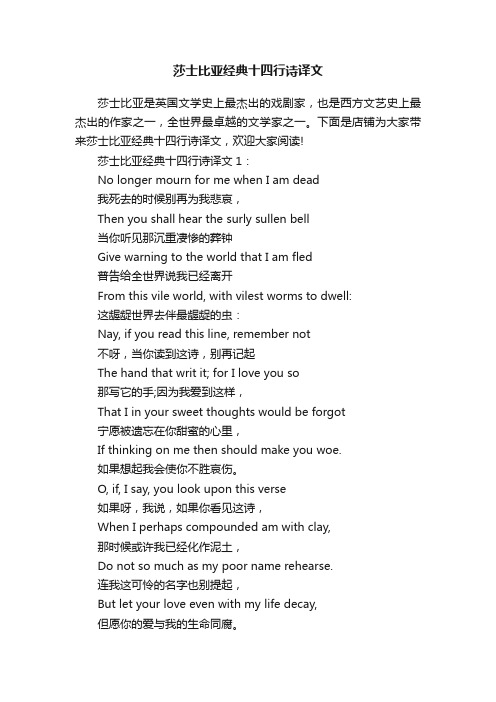
莎士比亚经典十四行诗译文莎士比亚是英国文学史上最杰出的戏剧家,也是西方文艺史上最杰出的作家之一,全世界最卓越的文学家之一。
下面是店铺为大家带来莎士比亚经典十四行诗译文,欢迎大家阅读!莎士比亚经典十四行诗译文1:No longer mourn for me when I am dead我死去的时候别再为我悲哀,Then you shall hear the surly sullen bell当你听见那沉重凄惨的葬钟Give warning to the world that I am fled普告给全世界说我已经离开From this vile world, with vilest worms to dwell:这龌龊世界去伴最龌龊的虫:Nay, if you read this line, remember not不呀,当你读到这诗,别再记起The hand that writ it; for I love you so那写它的手;因为我爱到这样,That I in your sweet thoughts would be forgot宁愿被遗忘在你甜蜜的心里,If thinking on me then should make you woe.如果想起我会使你不胜哀伤。
O, if, I say, you look upon this verse如果呀,我说,如果你看见这诗,When I perhaps compounded am with clay,那时候或许我已经化作泥土,Do not so much as my poor name rehearse.连我这可怜的名字也别提起,But let your love even with my life decay,但愿你的爱与我的生命同腐。
Lest the wise world should look into your moan 免得这聪明世界猜透你的心,And mock you with me after I am gone.在我死去后把你也当作笑柄。
莎士比亚十四行诗中文

莎士比亚十四行诗中文一对天生的尤物我们要求蕃盛,以便美的玫瑰永远不会枯死,但开透的花朵既要及时雕零,就应把记忆交给娇嫩的后嗣;但你,只和你自己的明眸定情,把自己当燃料喂养眼中的火焰,和自己作对,待自己未免太狠,把一片丰沃的土地变成荒田。
你现在是大地的清新的点缀,又是锦绣阳春的唯一的前锋,为什么把富源葬送在嫩蕊里,温柔的鄙夫,要吝啬,反而浪用,可怜这个世界吧,要不然,贪夫,就吞噬世界的份,由你和坟墓。
二当四十个冬天围攻你的朱颜,在你美的园地挖下深的战壕,你青春的华服,那么被人艳羡,将成褴褛的败絮,谁也不要瞧:那时人若问起你的美在何处,哪里是你那少壮年华的宝藏,你说,“在我这双深陷的眼眶里,是贪婪的羞耻,和无益的颂扬。
” 你的美的用途会更值得赞美,如果你能够说,“我这宁馨小童将总结我的账,宽恕我的老迈,” 证实他的美在继承你的血统~这将使你在衰老的暮年更生,并使你垂冷的血液感到重温。
三照照镜子,告诉你那镜中的脸庞,说现在这庞儿应该另造一副;如果你不赶快为它重修殿堂,就欺骗世界,剥掉母亲的幸福。
因为哪里会有女人那么淑贞她那处女的胎不愿被你耕种,哪里有男人那么蠢,他竟甘心做自己的坟墓,绝自己的血统, 你是你母亲的镜子,在你里面她唤回她的盛年的芳菲四月:同样,从你暮年的窗你将眺见——纵皱纹满脸——你这黄金的岁月。
但是你活着若不愿被人惦记,就独自死去,你的肖像和你一起。
四俊俏的浪子,为什么把你那份美的遗产在你自己身上耗尽, 造化的馈赠非赐予,她只出赁; 她慷慨,只赁给宽宏大量的人。
那么,美丽的鄙夫,为什么滥用那交给你转交给别人的厚礼, 赔本的高利贷者,为什么浪用那么一笔大款,还不能过日子, 因为你既然只和自己做买卖,就等于欺骗你那妩媚的自我。
这样,你将拿什么账目去交代,当造化唤你回到她怀里长卧, 你未用过的美将同你进坟墓; 用呢,就活着去执行你的遗嘱。
五那些时辰曾经用轻盈的细工织就这众目共注的可爱明眸,终有天对它摆出魔王的面孔,把绝代佳丽剁成龙锺的老丑: 因为不舍昼夜的时光把盛夏带到狰狞的冬天去把它结果; 生机被严霜窒息,绿叶又全下,白雪掩埋了美,满目是赤裸裸: 那时候如果夏天尚未经提炼,让它凝成香露锁在玻璃瓶里,美和美的流泽将一起被截断,美,和美的记忆都无人再提起: 但提炼过的花,纵和冬天抗衡,只失掉颜色,却永远吐着清芬。
莎士比亚十四行诗原文译文探析

莎士比亚十四行诗原文译文探析莎士比亚(William Shakespeare)是英国文学史上最伟大的剧作家之一,他的作品涵盖了多种题材和风格。
他的十四行诗被认为是他最具影响力的作品之一,也是他最著名的作品之一。
本文将探析几首莎士比亚的十四行诗的原文和译文,并对其进行解读和分析。
莎士比亚的十四行诗通常采用带有特定押韵格式的诗体,每行诗由十个音节(五对抑扬格)组成。
这种押韵格式被称为“莎士比亚诗体”或“英文十四行诗”。
莎士比亚的十四行诗主题涉及爱情、时间、美丽和死亡等广泛的话题,同时通过精炼的语言和演绎力强的形象描绘给读者深刻的印象。
首先让我们来看一首莎士比亚的十四行诗《当时所有最美丽的东西》,其原文如下:这首诗是莎士比亚的一首十分经典的爱情诗,表达了诗人对爱人美丽不朽的赞美。
诗中,诗人用夏日与爱人进行类比,并通过对夏日的描绘暗示出夏日的不完美与短暂。
与夏日相比,爱人的美丽更加温和和可贵。
诗人通过强烈的比较,表达了对爱人美丽的欣赏和爱恋的深度。
诗人还表达了对爱人不朽之美的赞赏。
诗中的“thy eternal summer shall not fade”表明爱人的美丽将永不褪色。
而最后两句“so long as men can breathe or eyes can see, so long lives this, and this gives life to thee.”则意味着这首诗将永远存在,并赋予了爱人永恒的生命。
下面是这首诗的中文译文:我可将你比喻为一个夏日吗?你比夏日更可爱、更温和:七月的风暴震动五月的爱芽,而夏日的租期太短暂:天空的眼睛有时炙热明亮,他的金色面容经常暗淡;美好婀娜终究会凋零,因时间流转,自然遗散;然而你永恒的夏天永不褪色,不失去拥有你这份美丽;死亡也别炫耀你走过阴影,因为你在永恒的诗歌里成长:只要人们呼吸、眼睛可见,它将长存,因它赋予你生命。
这个译文着重保持了原诗的意境和韵律,准确传达了原诗的主旨和情感。
莎士比亚 十四行诗

莎士比亚十四行诗莎士比亚十四行诗如下:1、shakespeare sonnet 12莎士比亚十四行诗when i do count the clock that tells the time,and see the brave day sunk in hideous night;when i behold the violet past prime,and sable curls all silver'd o'er with white: when lofty trees i see barren of leaves,which erst from heat did canopy the herd,and summer's green, all girded up in sheaves,born on the bier with white and bristly beard; then of thy beauty do i question make,that thou among the wastes of time must go,since sweets and beauties do themselves forsake, and die as fast as they see others grow;and nothing 'gainst time's scythe can make defence save breed, to brave him when he takes thee hence.翻译:当我数着壁上报时的自鸣钟,见明媚的白昼坠入狰狞的夜,当我凝望着紫罗兰老了春容,青丝的卷发遍洒着皑皑白雪;当我看见参天的树枝叶尽脱,它不久前曾荫蔽喘息的牛羊;夏天的青翠一束一束地就缚,带着坚挺的白须被舁上殓床;于是我不禁为你的朱颜焦虑:终有天你要加入时光的废堆,既然美和芳菲都把自己抛弃,眼看着别人生长自己却枯萎;没什么抵挡得住时光的毒手,除了生育,当他来要把你拘走。
莎翁十四行诗
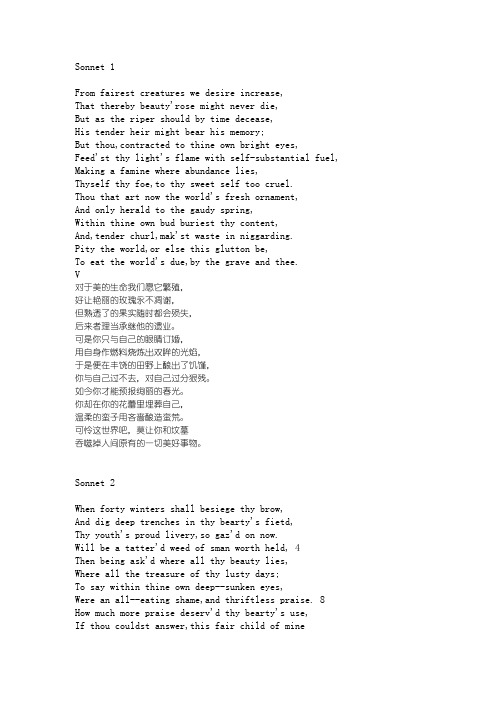
Sonnet 1From fairest creatures we desire increase,That thereby beauty'rose might never die,But as the riper should by time decease,His tender heir might bear his memory;But thou,contracted to thine own bright eyes,Feed'st thy light's flame with self-substantial fuel, Making a famine where abundance lies,Thyself thy foe,to thy sweet self too cruel.Thou that art now the world's fresh ornament,And only herald to the gaudy spring,Within thine own bud buriest thy content,And,tender churl,mak'st waste in niggarding.Pity the world,or else this glutton be,To eat the world's due,by the grave and thee.V对于美的生命我们愿它繁殖,好让艳丽的玫瑰永不凋谢,但熟透了的果实随时都会殒失,后来者理当承继他的遗业。
可是你只与自己的眼睛订婚,用自身作燃料烧炼出双眸的光焰,于是便在丰饶的田野上酿出了饥馑,你与自己过不去,对自己过分狠残。
如今你才能预报绚丽的春光。
你却在你的花蕾里埋葬自己,温柔的蛮子用吝啬酿造蛮荒。
可怜这世界吧,莫让你和坟墓吞噬掉人间原有的一切美好事物。
Sonnet 2When forty winters shall besiege thy brow,And dig deep trenches in thy bearty's fietd,Thy youth's proud livery,so gaz'd on now.Will be a tatter'd weed of sman worth held, 4Then being ask'd where all thy beauty lies,Where all the treasure of thy lusty days;To say within thine own deep--sunken eyes,Were an all--eating shame,and thriftless praise. 8 How much more praise deserv'd thy bearty's use,If thou couldst answer,this fair child of mineShall sum my count,and make my old excuse,Proving his beauty by succession thine. 12This were to be new made when thou art old,And see thy blood warm when thou feel'st it cold.当四十个冬天围攻你的容光,在你美的额头掘出深深的沟堑,你如今令人瞩目的青春华装,将变为不值几文的破破烂烂。
- 1、下载文档前请自行甄别文档内容的完整性,平台不提供额外的编辑、内容补充、找答案等附加服务。
- 2、"仅部分预览"的文档,不可在线预览部分如存在完整性等问题,可反馈申请退款(可完整预览的文档不适用该条件!)。
- 3、如文档侵犯您的权益,请联系客服反馈,我们会尽快为您处理(人工客服工作时间:9:00-18:30)。
莎士比亚十四行诗
文稿归稿存档编号:[KKUY-KKIO69-OTM243-OLUI129-G00I-FDQS58-
Shall I compare thee to summer's day? 我怎么能够把你来比作夏天
Thou art more lovely and more temperate: 你不独比它可爱也比它温婉
Rough winds do shake the darling buds of May,狂风把五月宠爱的嫩蕊作践,
And summer's lease hath all too short a date: 夏天出赁的期限又未免太短:
Sometime too hot the eye of heaven shines, 天上的眼睛有时照得太酷烈,
And often is his gold complexion dimm'd; 它那炳耀的金颜又常遭掩蔽:
And every fair from fair sometime declines, 被机缘或无常的天道所摧折,
By chance or nature's changing course untrimm'd;
没有芳艳不终于雕残或销毁。
But thy eternal summer shall not fade. 但是你的长夏永远不会雕落,
Nor lose possession of that fair thou owest; 也不会损失你这皎洁的红芳,
Nor shall Death brag thou wander'st in his shade,
或死神夸口你在他影里漂泊,
When in eternal lines to time thou growest: 当你在不朽的诗里与时同长。
So long as men can breathe or eyes can see,只要一天有人类,或人有眼睛,
So long lives this and this gives life to thee. 这诗将长存,并且赐给你生命。
我怎么能够把你来比作夏天
你不独比它可爱也比它温婉:
狂风把五月宠爱的嫩蕊作践,
夏天出赁的期限又未免太短:
天上的眼睛有时照得太酷烈,
它那炳耀的金颜又常遭掩蔽:
被机缘或无常的天道所摧折,
没有芳艳不终于雕残或销毁。
但是你的长夏永远不会雕落,
也不会损失你这皎洁的红芳,
或死神夸口你在他影里漂泊,
当你在不朽的诗里与时同长。
只要一天有人类,或人有眼睛,
这诗将长存,并且赐给你生命。
四行诗是源于意大利民间的一种抒情短诗,文艺复兴初期时盛行于整个欧洲,其结构十分严谨,分为上下两部分,上段为八行,下段为六行,
每行十一个音节,韵脚排列:abba abba,cdc ded。
莎士比亚的十四行诗的结构却更严谨,他将十四个诗行分为两部分,第一部分为三个四行,第二部分为两行,每行十个音节,韵脚为:abab,cdcd,efef,gg。
这样的格式后来被称为“莎士比亚式”或“伊丽莎白式”。
对诗人而言,诗的结构越严禁就越难抒情,而莎士比亚的十四行诗却毫不拘谨,自由奔放,正如他的剧作天马行空,其诗歌的语言也富于想象,感情充沛。
正如同一个人可以有不止一张照片或者画像那样,一首诗歌也可以有不止一个翻译。
这照片、画像、翻译自然不会完全相同,会有优劣好坏的差别。
但是,由于欣赏者的口味不一,在不同的欣赏者眼里,不同的作品会有不同的得分。
这首诗的艺术特点首先是在于它有着双重主题:一是赞美诗人爱友的美貌,二是歌颂了诗歌艺术的不朽力量。
其次就是诗人在诗中运用了新颖的比喻,但又自然而生动。
本文以莎士比亚的十四行诗第十八首<夏日>里的几个意象作为对朋友美的暗示为切入点:狂风、苍天的巨眼、金彩的脸色,探讨莎翁在赞扬人性方面所涉及的人类和自然之间的关系以及对诗歌主题的宇宙化延伸.
文言译文:美人当青春,婉丽自销魂。
焉知东风恶,良辰讵待人
朝日何皋皋,暮色何昏昏。
众芳俱摇落,天意倩谁询我有丹青笔,腾挪似有神。
为君驻颜色,风霜不可侵。
丹青亦难久,罔若诗与琴延年歌一曲,万古扬清芬。
白话译文:我能否将你比作夏天你比夏天更美丽温婉。
狂风将五月的蓓蕾凋残,夏日的勾留何其短暂休恋那丽日当空,转眼会云雾迷蒙。
休叹那百花飘零,催折于无常的天命。
唯有你
永恒的夏日常新,你的美亦将毫发无损。
死神也无缘将你幽禁,你在我永恒的诗中长存。
只要世间尚有人类,尚有能看的眼睛,这诗就将流传,赋予你新的生命。
白话译本:
我能否将你比作夏天?
你比夏天更美丽温婉。
狂风将五月的蓓蕾凋残,
夏日的勾留何其短暂。
休恋那丽日当空,
转眼会云雾迷蒙。
休叹那百花飘零,
催折于无常的天命。
唯有你永恒的夏日常新,
你的美貌亦毫发无损。
死神也无缘将你幽禁,
你在我永恒的诗中长存。
只要世间尚有人吟诵我的诗篇,
这诗就将不朽,永葆你的芳颜。
沁园春1[1]·莎士比亚十四行诗第29首
残夜沉沉,四野幽幽,独仰斗牛2[2]。
叹命途多舛,功名无梦;流离颠沛,失意蒙羞。
我欲呼天,苍天无耳,此恨绵绵不可休3[3]。
流清泪,问云山雾水,何处归舟
当年豪气难酬。
更逝水流年憎白头4[4]。
羡相如才气,文章山斗;谢家子弟,竞逞风流5[5]。
忽忆知音,莺啼雀跃,无限春风明月楼6[6]。
生平事,念此情长在,不屑王侯7[7]。
当我受尽命运和人们的白眼,
暗暗地哀悼自己的身世飘零,
徒用呼吁去干扰聋瞆的昊天,
顾盼着身影,诅咒自己的生辰,
愿我和另一个一样富于希望,
说到这段的赏析大多数的人肯定会从积极乐观的方向来思考,但我读了该诗后觉得更多的是作者那种对社会、对自己的命运的不满和无赖,虽然诗里表现得那么大无谓。
按照我们中国式的说法就是有点阿Q精神!
面貌相似,又和他一样广交游,
希求这人的渊博,那人的内行,
最赏心的乐事觉得最不对头;
可是,当我正要这样看轻自己,
忽然想起了你,于是我的精神,
便像云雀破晓从阴霾的大地
振翮上升,高唱着圣歌在天门:
一想起你的爱使我那么富有,
和帝王换位我也不屑于屈就
When, In Disgrace With Fortune and Men's Eyes
by William Shakespeare (1564-1616)
When,in disgrace with fortune and men's eyes,
I all alone beweep my outcast state
And trouble deaf heaven with my bootless cries
And look upon myself and curse my fate,
Wishing me like to one more rich in hope,
Featur'd like him, like him with friends possess'd, Desiring this man's art and that man's scope,
With what I most enjoy contented least;
Yet in these thoughts myself almost despising,
Haply I think on thee, and then my state,
Like to the lark at break of day arising
From sullen earth, sings hymns at heaven's gate; For thy sweet love remember'd such wealth brings That then I scorn to change my state with kings. Iambic 五音步诗行 pentameter rhythm rhyme。
